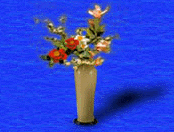
![]()


![]()

Ching Dynasty Grand Hall Offertory Flower Arrangement
Flower: Day lily, mei flower, pomegranate, plantain leaf, scrolls
Vessels and accessories: Porcelain vase in imitation of a bronze vessel,
incense burner, a container for scrolls, a bronze plate, a flower-shaped
brush-wash dish
Flower style: Literati style stylied flower arrangement
This type of arrangement was very popular among wealthy and prominent
people during the Ching Dynasty, and was often used, as decoration to liven
up old, musty antiques. Several branches of whir, plum blossoms and a few
deep red camellias bring a light to the eye and a bost to the spirit, while
the placing of a dark green plantain leaf at the lower right provides an
added touch of freshness. The pomegranate fruit on the bronze plate, rough
and dry from long exposure to the sun, contains a myriad of seeds, symbolizing
the traditional hope for abundant offspring.
Expressionism in flower arranging involves the same explosive emotion and free-handed creativity as impressionism in painting. The arranger's intense desire to express himself is evident in the unconventional ingredients of this composition: Hoary old plum flowers languishing their branches down the walls of a shimmering crystal vase, and a dazzling, dew-bedecked peony clinging silently to the side of the flower pot like a fiery dragon sporting with a resplendent phoenix. The style, simple yet illuminating, represents the high watermark of literati expressionism.
![]()
One set of flowers rises above the other in this twin arrangement composition. The flowers are arranged in a ta chi configuration, symbolic of great auspicion and good fortune. Each group consists of a fixed number of fruits and flowers, in keeping with the traditions of the stylized flower arrangements.

![]()
[preface] [
styles] [religious]
[palace]
[literati]
[folk] [9 pricniples]
[significance] [preveration]
[vessels] [appreciatin]
[Pavilion of Taiwan, R.O.c] [Cultures] [Council For Cultural Affairs]